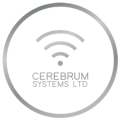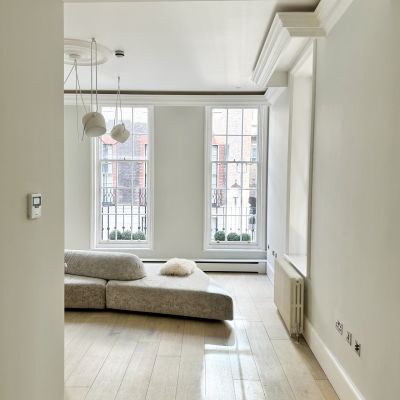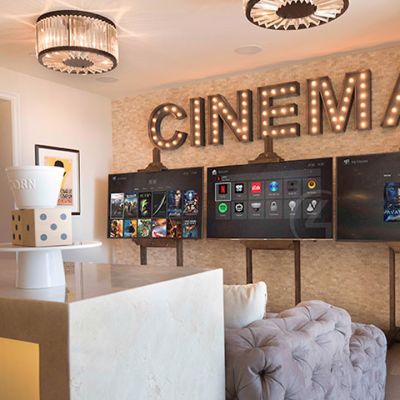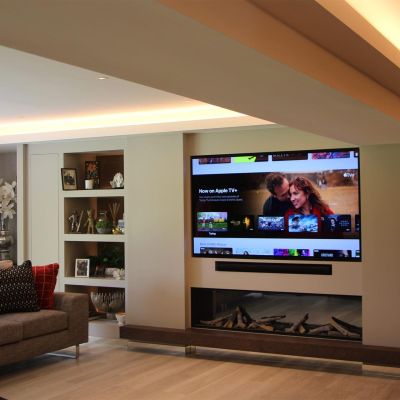It is currently estimated that lighting accounts for approximately 15% of global energy consumption and 5% of greenhouse gas emissions.* The issue of sustainability is a top priority for both consumers and smart home integrators right now, and smart lighting is leading the way when it comes to energy efficient home automation design. Smart lighting not only allows you to tailor the ambience of your home to suit your requirements, but it could also save you money and decrease your carbon footprint in the process. Read on to find out how-
THE USE OF LED BULBS
As with the majority of modern lighting, smart lighting uses LED bulbs. LEDs have been proven to be up to 80% more efficient than traditional halogens, in addition to having longer lifespans. On average, LED bulbs can up to 25 times longer- meaning you won’t need to change them as frequently.*
LED bulbs require just 10% of the electricity used by an incandescent bulb, whilst producing the same amount of light. Current usage of LED bulbs suggest that by 2027, widespread use of the lights could save the country about 348 terawatt hours in electricity based on current electric rates.*
When you do need to change your bulbs, LEDs make the process a lot easier. Unlike traditional bulbs, LEDs don’t contain any hazardous materials. This means there’s no need to arrange for vehicles to pick up and dispose of them, leading to fewer emissions on the road.
INCREASED LIGHTING CONTROL
One of the positives about smart lighting is the increased level of control and personalisation it provides. A system integrator often allows you to remotely control your lighting from your phone, meaning you can turn your lights on and off from anywhere in the world. Set lights to come on at certain times, or programme ‘scenes’ to create certain brightness levels and add ambience to the space. This element means that not only are your lights controlled and displayed exactly as you’d wish, but it also saves on electricity use.
We’ve also seen how smart lighting systems can lower energy consumption within cities. Currently, cities consume up to 78% of the world’s energy. Cities in Denmark have implemented smart lighting systems to increase or decrease illumination levels depending on how busy the streets are, the time of night, or whether movement is present. *
So, how can you introduce smart lighting into your home and what are lighting companies doing to make it a more sustainable option? We spoke to lighting and design experts Lighting of London on what they’re doing to implement sustainability into their products, and what they think the future holds for sustainable lighting design-
How is implementing energy efficient lighting important to your business?
An energy efficient approach to lighting design and product development is an essential part of Lighting of London. We promote economic efficiency and a sustainable approach. We consider ourselves a modern company with a modern outlook that encompasses energy efficiency as a crucial part of our mission and we recognise that we have a responsibility to promote an environmentally conscious approach. We aim to do the best possible for our customers and that includes providing the latest in design and products that ensure the highest energy efficiency. We feel that our customers would expect this approach from us.
How are you beginning to introduce energy efficient lighting?
From the outset we have sourced energy efficient options. Our design incorporates an efficient approach for both economic reasons and to promote sustainability. Lumens per watt (lm/W) refers to the energy efficiency of lighting- therefore we engineer each product to give a maximum out per watt.
Why do you think energy efficient lighting is important for smart homes?
Smart homes will need to be energy efficient to fulfil the potential of smart technology and meet customers’ expectations. Customers increasingly expect that technological compatibility offers distinct advantages, including economic efficiency and a sustainable outlook. Energy efficiency lighting is an obvious and natural component to a smart approach.
Are you implementing this to the products you produce?
At Lighting of London we always source energy efficient options and we see that sustainability and environmental awareness are promoted more regularly in product specifications. These make it easier for us to make purchase choices and to design lighting systems with more eco-credibility and environmental awareness.
What do you think the future looks like for smart lighting?
Electricity should always be provided by renewable sources and design should promote accessibility, economic efficiency and technical compatibility.
For more information on Lighting of London, visit their website- https://bit.ly/2X6kX3n





